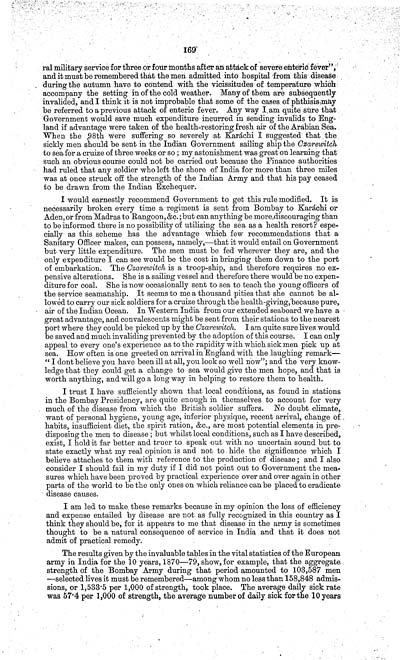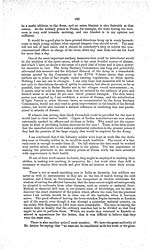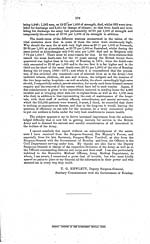Medicine - Disease > Report on enteric fever
(207) Page 169
Download files
Individual page:
Thumbnail gallery: Grid view | List view

169
ral military service for three or four months after an attack of severe enteric fever",
and it must be remembered that the men admitted into hospital from this disease
during the autumn have to contend with the vicissitudes of temperature which
accompany the setting in of the cold weather. Many of them are subsequently
invalided, and I think it is not improbable that some of the cases of phthisis may
be referred to a previous attack of enteric fever. Any way I am quite sure that
Government would save much expenditure incurred in sending invalids to Eng-
land if advantage were taken of the health-restoring fresh air of the Arabian Sea.
When the 98th Were suffering so severely at Karchi I suggested that the
sickly men should be sent in the Indian Government sailing ship the Czarewitch
to sea for a cruize of three weeks or so; my astonishment was great on learning that
such an obvious course could not be carried out because the Finance authorities
had ruled that any soldier who left the shore of India for more than three miles
was at once struck off the strength of the Indian Army and that his pay ceased
to be drawn from the Indian Exchequer.
I would earnestly recommend Government to get this rule modified. It is
necessarily broken every time a regiment is sent from Bombay to Karchi or
Aden, or from Madras to Rangoon, &c.; but can anything be more discouraging than
to be informed there is no possibility of utilizing the sea as a health resort? espe-
cially as this scheme has the advantage which few recommendations that a
Sanitary Officer makes, can possess, namely,-that it would entail on Government
but very little expenditure. The men must be fed wherever they are, and the
only expenditure I can see would be the cost in bringing them down to the port
of embarkation. The Czarewitch is a troop-ship, and therefore requires no ex-
pensive alterations. She is a sailing vessel and therefore there would be no expen-
diture for coal. She is now occasionally sent to sea to teach the young officers of
the service seamanship. It seems to me a thousand pities that she cannot be al-
lowed to carry our sick soldiers for a cruize through the health-giving, because pure,
air of the Indian Ocean. In Western India from our extended seaboard we have a
great advantage, and convalescents might be sent from their stations to the nearest
port where they could be picked up by the Czarewitch. I am quite sure lives would
be saved and much invaliding prevented by the adoption of this course. I can only
appeal to every one's experience as to the rapidity w ith which sick men pick up at
sea. How often is one greeted on arrival in England with the laughing remark-
" I dont believe you have been ill at all, you look so well now"; and the very know-
ledge that they could get a change to sea would give the men hope, and that is
worth anything, and will go a long way in helping to restore them to health.
I trust I have sufficiently shown that local conditions, as found in stations
in the Bombay Presidency, are quite enough in themselves to account for very
much of the disease from which the British soldier suffers. No doubt climate,
want of personal hygiene, young age, inferior physique, recent arrival, change of
habits, insufficient diet, the spirit ration, &c., are most potential elements in pre-
disposing the men to disease; but whilst local conditions, such as I have described,
exist, I hold it far better and truer to speak out with no uncertain sound but to
state exactly what my real opinion is and not to hide the significance which I
believe attaches to them with reference to the production of disease; and I also
consider I should fail in my duty if I did not point out to Government the mea-
sures which have been proved by practical experience over and over again in other
parts of the world to be the only ones on which reliance can be placed to eradicate
disease causes.
I am led to make these remarks because in my opinion the loss of efficiency
and expense entailed by disease are not as fully recognized in this country as I
think they should be, for it appears to me that disease in the army is sometimes
thought to be a natural consequence of service in India and that it does not
admit of practical remedy.
The results given by the invaluable tables in the vital statistics of the European
army in India for the 10 years, 1870-79, show, for example, that the aggregate
strength of the Bombay Army during that period amounted to 103,587 men
-selected lives it must be remembered-among whom no less than 158,848 admis-
sions, or 1,533.5 per 1,000 of strength, took place. The average daily sick rate
was 57.4 per 1,000 of strength, the average number of daily sick forthe 10 years
ral military service for three or four months after an attack of severe enteric fever",
and it must be remembered that the men admitted into hospital from this disease
during the autumn have to contend with the vicissitudes of temperature which
accompany the setting in of the cold weather. Many of them are subsequently
invalided, and I think it is not improbable that some of the cases of phthisis may
be referred to a previous attack of enteric fever. Any way I am quite sure that
Government would save much expenditure incurred in sending invalids to Eng-
land if advantage were taken of the health-restoring fresh air of the Arabian Sea.
When the 98th Were suffering so severely at Karchi I suggested that the
sickly men should be sent in the Indian Government sailing ship the Czarewitch
to sea for a cruize of three weeks or so; my astonishment was great on learning that
such an obvious course could not be carried out because the Finance authorities
had ruled that any soldier who left the shore of India for more than three miles
was at once struck off the strength of the Indian Army and that his pay ceased
to be drawn from the Indian Exchequer.
I would earnestly recommend Government to get this rule modified. It is
necessarily broken every time a regiment is sent from Bombay to Karchi or
Aden, or from Madras to Rangoon, &c.; but can anything be more discouraging than
to be informed there is no possibility of utilizing the sea as a health resort? espe-
cially as this scheme has the advantage which few recommendations that a
Sanitary Officer makes, can possess, namely,-that it would entail on Government
but very little expenditure. The men must be fed wherever they are, and the
only expenditure I can see would be the cost in bringing them down to the port
of embarkation. The Czarewitch is a troop-ship, and therefore requires no ex-
pensive alterations. She is a sailing vessel and therefore there would be no expen-
diture for coal. She is now occasionally sent to sea to teach the young officers of
the service seamanship. It seems to me a thousand pities that she cannot be al-
lowed to carry our sick soldiers for a cruize through the health-giving, because pure,
air of the Indian Ocean. In Western India from our extended seaboard we have a
great advantage, and convalescents might be sent from their stations to the nearest
port where they could be picked up by the Czarewitch. I am quite sure lives would
be saved and much invaliding prevented by the adoption of this course. I can only
appeal to every one's experience as to the rapidity w ith which sick men pick up at
sea. How often is one greeted on arrival in England with the laughing remark-
" I dont believe you have been ill at all, you look so well now"; and the very know-
ledge that they could get a change to sea would give the men hope, and that is
worth anything, and will go a long way in helping to restore them to health.
I trust I have sufficiently shown that local conditions, as found in stations
in the Bombay Presidency, are quite enough in themselves to account for very
much of the disease from which the British soldier suffers. No doubt climate,
want of personal hygiene, young age, inferior physique, recent arrival, change of
habits, insufficient diet, the spirit ration, &c., are most potential elements in pre-
disposing the men to disease; but whilst local conditions, such as I have described,
exist, I hold it far better and truer to speak out with no uncertain sound but to
state exactly what my real opinion is and not to hide the significance which I
believe attaches to them with reference to the production of disease; and I also
consider I should fail in my duty if I did not point out to Government the mea-
sures which have been proved by practical experience over and over again in other
parts of the world to be the only ones on which reliance can be placed to eradicate
disease causes.
I am led to make these remarks because in my opinion the loss of efficiency
and expense entailed by disease are not as fully recognized in this country as I
think they should be, for it appears to me that disease in the army is sometimes
thought to be a natural consequence of service in India and that it does not
admit of practical remedy.
The results given by the invaluable tables in the vital statistics of the European
army in India for the 10 years, 1870-79, show, for example, that the aggregate
strength of the Bombay Army during that period amounted to 103,587 men
-selected lives it must be remembered-among whom no less than 158,848 admis-
sions, or 1,533.5 per 1,000 of strength, took place. The average daily sick rate
was 57.4 per 1,000 of strength, the average number of daily sick forthe 10 years
Set display mode to: Large image | Zoom image | Transcription
Images and transcriptions on this page, including medium image downloads, may be used under the Creative Commons Attribution 4.0 International Licence unless otherwise stated. ![]()
| India Papers > Medicine - Disease > Report on enteric fever > (207) Page 169 |
|---|
| Permanent URL | https://digital.nls.uk/74577988 |
|---|
| Description | Dated 1883, report of typhoid fever at stations occupied by British troops in Bombay Presidency. |
|---|---|
| Shelfmark | IP/13/SB.6 |
| Additional NLS resources: | |




